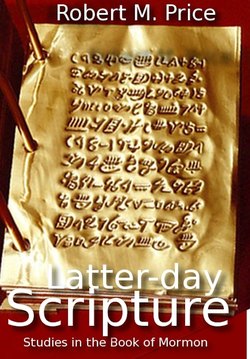Latter-day Scripture

Реклама. ООО «ЛитРес», ИНН: 7719571260.
Оглавление
Robert M. Price. Latter-day Scripture
Introduction: The Golden Bible of Joseph Smith
Chapter 1: The Problem of the Canon and Further Revelation
Chapter 2: Prophecy and Palimpsest
Chapter 3: Joseph Smith in the Book of Mormon
Chapter 4: The Nineteenth-Century Setting of 3 Nephi 1:24-25
Chapter 5: Later and Later Day Saints
Chapter 6: The Oracles of Samuel the Lamanite
Chapter 7: From the Scribe of Benjamin
Chapter 8: Morton Smith as Joseph Smith
Отрывок из книги
Critical Studies in the Book of Mormon
A Way in the Wilderness
.....
The exclusive preserve of religion, I think, is not nature, whence all our ethics, if we are wise, ultimately stem, but rather grace. Grace need have nothing to do with supernatural sacred force. It is basically the same word as gratuitousness, the icing on the cake, what is above and beyond the call of strict duty. Religion provides it, as music and art do, for religion is a member of the same species, a human creation, very often a noble and edifying one. All religions offer us an epic which we may embrace. They offer us symbols rooted, a la Carl Jung, in the unconscious, symbols we must, or at least may, access to facilitate the process of individuation. Ritual is the way we access them, like clicking on the icons on our computer screen to bring this or that program on line from the depths of the computer. The sacred is that artistic second-sight, that superimposition of the artistic and the fictive over the bare earth of pragmatism and the mundane. The secularist feels no need for it, just as one may feel no need for classical music. But having a tin ear is nothing to brag about either.
The grace, the gratuity, of religion includes a moral vision transcending the pragmatic, the lowest common denominator. As Aquinas knew, Aristotle had adequately defined righteousness, but Christ defined sanctification. One may be righteous without loving the enemy, but religion offers a vision whereby selfishness may be transcended by expanding the circle of the ego to embrace the estranged. Such is the path of the Bodhisattva. Heroism is not required, but it is admired. You have every right not to forgive. Justice does not require that you do. But if you heed the Buddha and the Christ, and forgive your enemy, you break through to a zone of transcendent freedom. As Tillich said, mercy is “creative justice.” And it is sacred. But we must not let it become legalism, literalism, so that one not only forgives the one who has injured one but also thinks it wrong to fight in defense of the innocent. In that moment, heroism has become fanaticism. Bravery has become snake-handling. Self-sacrifice has become repression.
.....